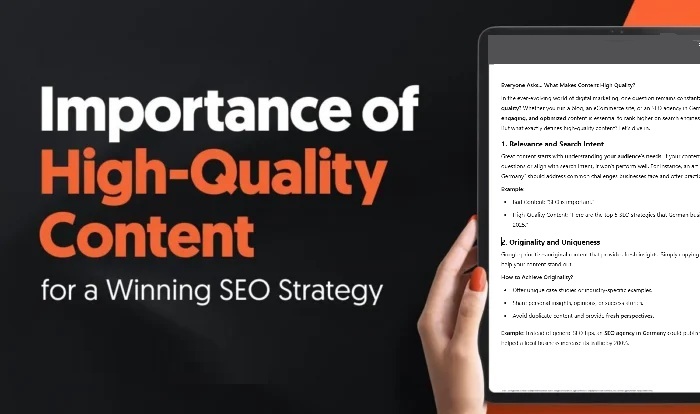
In the ever-evolving world of digital marketing, one question remains constant: What makes content high quality? Whether you run a blog, an eCommerce site, or an SEO agency in Germany, creating valuable, engaging, and optimized content is essential to rank higher on search engines and attract the right audience. But what exactly defines high-quality content? Let’s dive in.
1. Relevance and Search Intent
Great content starts with understanding your audience’s needs. If your content doesn’t answer the right questions or align with search intent, it won’t perform well. For instance, an article on “Best SEO Strategies in Germany” should address common challenges businesses face and offer practical solutions.
Example:
- Bad Content: “SEO is important.”
- High-Quality Content: “Here are the top 5 SEO strategies that German businesses should implement in 2025.”
2. Originality and Uniqueness
Google prioritizes original content that provides fresh insights. Simply copying existing information won’t help your content stand out.
How to Achieve Originality?
- Offer unique case studies or industry-specific examples.
- Share personal insights, opinions, or success stories.
- Avoid duplicate content and provide fresh perspectives.
Example: Instead of generic SEO tips, an SEO agency in Germany could publish a case study on how they helped a local business increase its traffic by 200%.
3. Well-Structured and Readable Format
Nobody enjoys reading large blocks of text. High-quality content should be easy to scan and understand.
Best Practices:
- Use short paragraphs and bullet points.
- Add subheadings (H2, H3) for better navigation.
- Include images, infographics, or videos to improve readability.
4. Accuracy and Trustworthiness (E-E-A-T)
Google evaluates content using E-E-A-T (Experience, Expertise, Authoritativeness, Trustworthiness). If your website lacks credibility, it won’t rank well.
How to Build Trust?
- Cite reputable sources and include relevant statistics.
- Use expert quotes or author bylines with credentials.
- Keep information up-to-date with regular content audits.
5. SEO Optimization Without Keyword Stuffing
Good content balances SEO and user experience. Keyword stuffing can harm rankings, but proper optimization improves visibility.
SEO Best Practices:
- Use primary and secondary keywords naturally.
- Optimize meta descriptions and title tags.
- Add internal and external links to credible sources.
6. Engagement and Value
Your content should encourage user interaction and provide real value. Consider these engagement strategies:
- Use storytelling to make topics relatable.
- Ask readers questions or encourage comments.
- Provide actionable takeaways.
Example: Instead of just defining SEO, an SEO agency in Germany could offer a free SEO audit checklist or step-by-step tutorial.
Conclusion
High-quality content is more than just words—it’s about relevance, originality, structure, accuracy, SEO, and engagement. If your goal is to stand out as an SEO agency in Germany, focus on creating content that truly helps and informs your audience. By following these principles, your content won’t just rank higher—it will drive real results.
Start optimizing your content today and watch your website’s performance soar!

